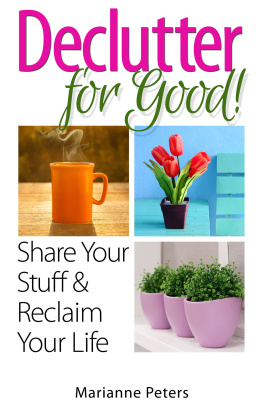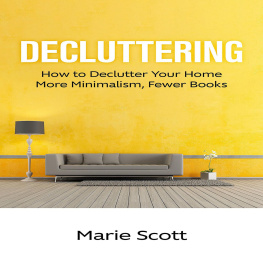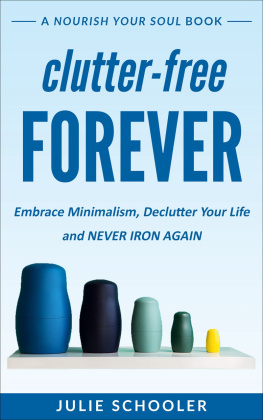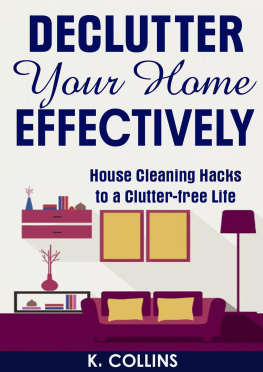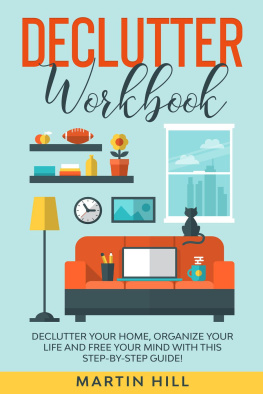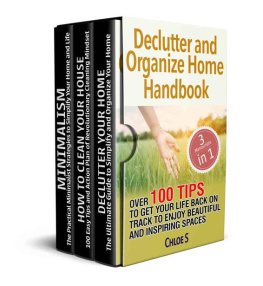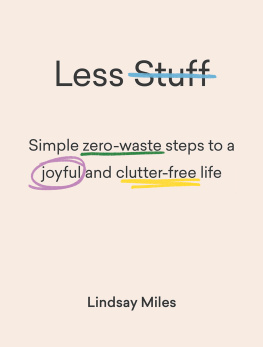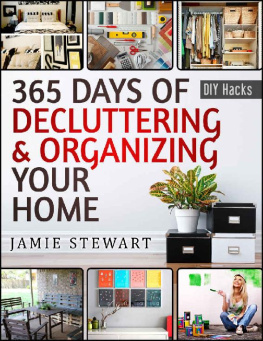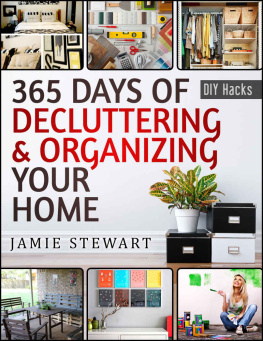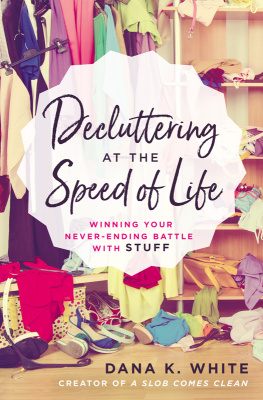Declutter for Good: Share Your Stuff and Reclaim Your Life. Copyright 2014 Marianne Peters Final Edition: August 2014
All Rights Reserved
Do not share or forward this work, or reproduce any portion by any means, without written permission of the author/publisher.
Cover designed by eBook DesignWorks.
ISBN 978-0-692-02
ISBN: 9780692028421
Marianne Peters is the owner of Fresh Words Writing Company. She delivers fresh words and first-rate writing service to her clients, specializing in equipping busy people to live greener, more sustainable lives. Find out more about Marianne at .
TABLE OF CONTENTS
PART-ONE: RECLAIM YOUR LIFE
Own Less, Live More
Perhaps youve noticed lately that your life revolves around your stuff.
- Does picking up the house make you want to pick up and leave?
- Do you buy storage bins every time you shop, just in case?
- Do you avoid inviting friends over because of the chronic mess?
Maybe your circumstances shifted, altering your relationship with your belongings.
- Have you recently experienced a major life change? (Divorce? Death of a loved one? Job relocation?)
- Have your grown kids moved out, prompting thoughts of downsizing?
- Has your health limited your ability to care for your property?
My friend Marcy filled her three-story house with lovely antiquesa lifetime of beautiful possessions selected with her decorators flair. Last year, though, Marcys life dramatically changed. An energetic sixty-something, she suffered a series of mini-strokes that left her hospitalized. She recovered, but the experience transformed her attitude. Now she longs to travel, enjoy her grandchildren, and explore her hobbies, not manage a large house. She plans to stage a big garage sale and offer her favorite possessions to friends, family, and charities.
My familys transformation didnt happen as dramatically as Marcys. We accepted the accumulation of stuff as part of suburban home ownership until we were up to our ears. But unlike the frog simmering away in hot water until hes been boiled, we decided that we wanted to change our lifestyle now.
We decided to jump out of the pot.
A Right-Sized Life
For fifteen years, my family inhabited a spacious suburban home with 3,200 square feet of living space and an acre of lawn, trees, and gardensthe kind of home Id always imagined.
My husband and I bought the house right after graduate school. No more two-bedroom apartment for us! In a small-town housing market, we could afford lots of room, so we had lots of rooms: family room, living room, den, eat-in kitchen, dining room, sun room, four bedrooms, two full baths, full basement with an extra bedroom, two-car garage, four walk-in closets, and two fireplaces. I threw myself into decorating, guided by the friendly spirit of Martha Stewart. As our family grew, we filled the house with more and more possessions, including books, toys, furniture, a baby grand piano, and a china cabinet the size of an African elephant, packed with dishes and knick-knacks.
Owning all that stuff meant time spent caring for it. We obeyed The Law of Suburbia: Thou Shalt Work in Thy Yard Every Weekend. Then I spent the rest of the week cleaning, dusting, tidying, sorting, rearranging, and otherwise maintaining our possessions. As the years went by, we began to question our lifestyle. Sure, we could afford a big place. But did four people need this much room? Was the house outgrowing us instead of the other way around? During this time, our kids learned about going green at school and summer camp. Inspired by them, I nudged our family toward a more sustainable lifestyle. As we learned about environmental issues, we made big changes in the way we used our resources. But I had a nagging feeling we could be doing more.
Attempting to simplify, I tried to organize my possessions with totes, bins, shelves, and baskets. Clutter would go underground for a while, but eventually resurface, and I would repeat the painful process again six months later. Why could I never reach the bottom of my drawers or the back of my closet? Eventually I realized that the key to a simpler, greener lifestyle is not better organizationits less stuff.
After months of prayer and discussion, my family decided to move to a residence we had found right in the heart of town. The kicker: it measured half the size of our big suburban house. Leaving our kids childhood home, our good neighbors, and my abundant garden seemed a bit crazy, but we could not deny an irrepressible urge to live with less, to live a life more in tune with our values and our community. It reminded me of punching the reset button on my computer. Living closer to our daughters schools, the library, the post office, stores, parks, and restaurants sealed the deal.
To fit into our small house, we had to eliminate three-quarters of our possessions. I had never needed to purge so much; in fact, the task took a year. But undertaking such a job made me think twice about owning anythingbig or small. My familys life has changed for the better.
Living with Less: Inspiration, Not Deprivation
You might be asking, why worry about decluttering in the first place?
There are some distinct benefits to living with less. Since my family pared down our possessions, we have found that:
- Staying decluttered saves money, so we are able to spend our resources on things we love to dopursuing work and hobbies, traveling with our children, and volunteering for community organizations.
- Owning less means less to maintain. My husband spent three hours at a time mowing the lawn each week. Now, with a smaller yard, cutting the grass takes fifteen minutes.
- Locating items around the house requires very little time, and I use practically everything I own.
- Living more sustainably means were reducing our waste, saving energy, and using fewer of the earths precious resources.
- The temptation to consume diminishes. Instead of constantly shopping for more, we have learned to ask ourselves some basic questions. Do I need it? Will I use it? Can I borrow it instead of buying it? Do I have a place for it? Can I afford it?
Living with less is not giving up the American Dream. But the dream deserves a second look. People in my region live large: big houses, big appliances, and big cars. The conventional wisdom says if you can upsize, do iteven if you have to take on debt. Save everything just in case. If you run out of room to store it all, buy a bigger place.
Americans are a privileged minority in the world, yet, in study after study, our citizens rank lower on the scale of personal happiness or satisfaction than many people we would consider poor. Spending money on stuff does not meet our need for love, community, identityall those things that make life worth living.
Spending money on objects also has an environmental cost. The more I owned, the more I purchased, and the more I threw away. (Annie Leonards movie The Story of Stuff shares this cycle so eloquently.)
A few people do need professional help to deal with the deeper issues behind their clutter collecting. However, most of us just need encouragement to start and a roadmap to follow.
Living with Less: Building Sustainable Communities (or, Why I Wrote This Book)
Many people undertake decluttering as a means of self-actualization. As in, I lost my clutter and found myself!
Happily, this is one by-product of decluttering that I have experienced. I used to be a consumer par excellence. I would buy an item, use it for a while, and then ditch it. I spent hours shopping merely for entertainment or solace. The authors of the book Affluenza classify constant consumption like mine as a social disease. (How flattering.) Heres their definition:
Next page
